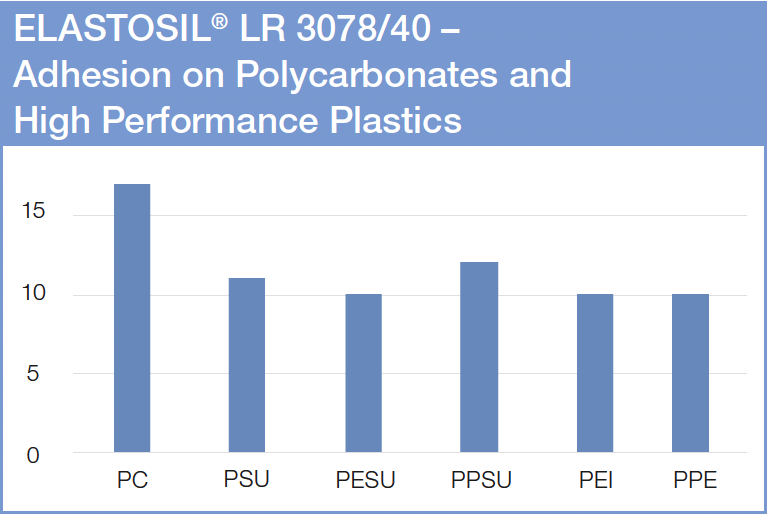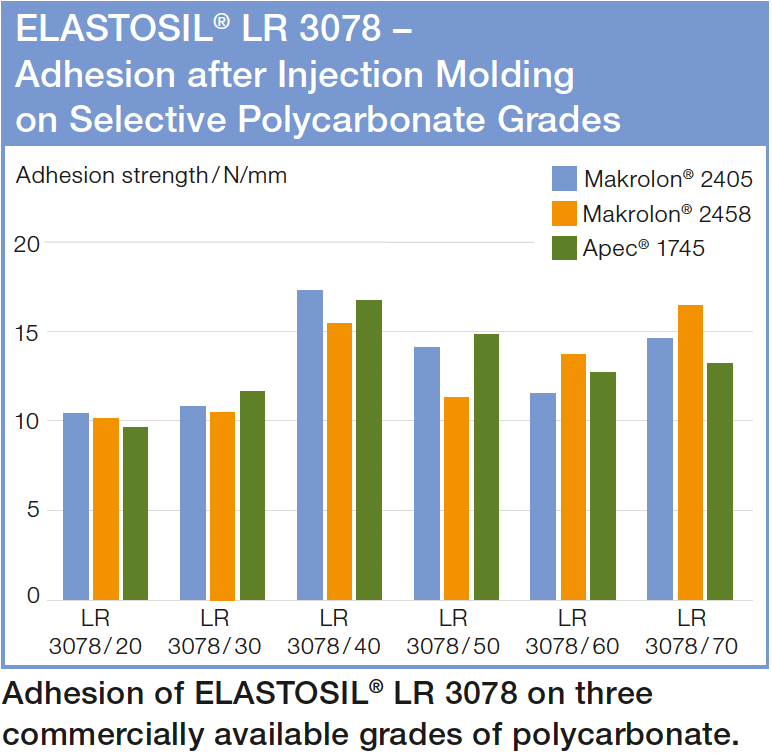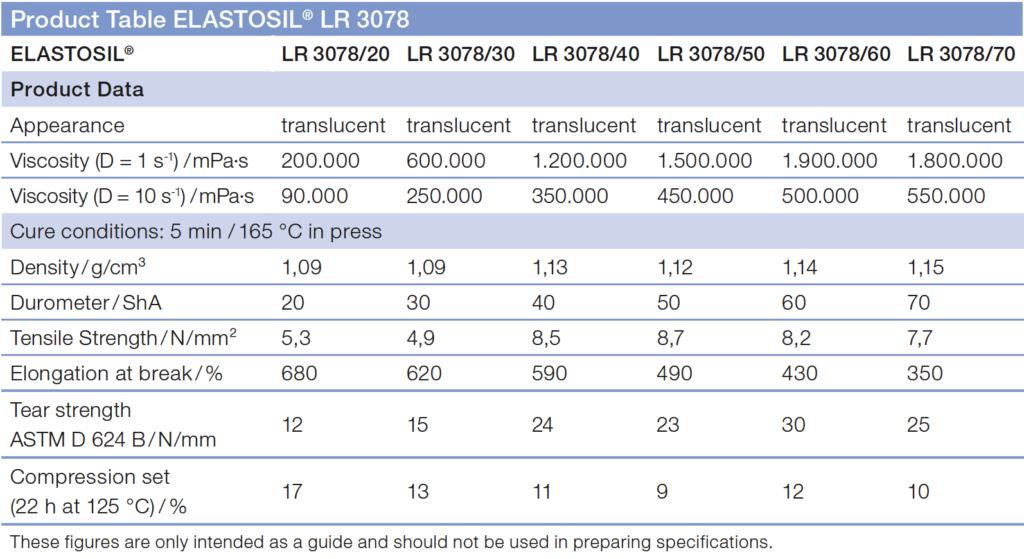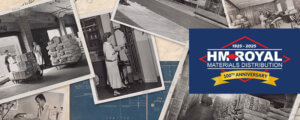New Elastomer Formulation Extends Liquid Silicone Rubber Overmolding Onto Polycarbonates
Reading Time: 4 minutes
Last Updated on March 26, 2025
Manufacturers frequently use a process called overmolding, which involves layering or molding one material over an existing substrate to enhance the final product’s properties, functionality and design. For example, liquid silicone rubber (LSR) overmolding onto substrates such as plastic or metal creates a high-performance end product that is both durable and flexible.
Wacker Chemical’s high-performance ELASTOSIL® LR 3078 extends the capabilities of LSR overmolding to more challenging polycarbonates and high-performance plastics. These materials often present difficulties due to compatibility and adhesion issues.
Benefits of Liquid Silicone Rubber Overmolding
Liquid silicone rubber, such as ELASTOSIL LR 3078, offers a unique combination of properties and manufacturing flexibility. The characteristics that have contributed to the widespread adoption of liquid silicone rubber overmolding include:
- Choice of colors: LSR is available in a range of translucent and custom colors or tints, enabling intricate designs and vibrant finishes that enhance aesthetics. This feature is particularly beneficial for consumer goods and medical products that require both functionality and aesthetic appeal.
- High temperature resistance: LSR remains flexible at both high and low temperatures, ensuring reliable performance in extreme conditions.
- Durability: Resistance to wear, tear and aging makes it ideal for long-term use.
- Biocompatibility: It is safe for use in medical, food and consumer products.
- Functional versatility: It combines the strengths of both rigid and flexible materials, enhancing product functionality and performance.
- Environmental and chemical resistance: It provides protection against heat, UV light, weathering, chemicals and abrasion, increasing the durability of the overmolded part.
The ELASTOSIL LR 3078 Difference
ELASTOSIL LR 3078 is a self-adhering, two-component LSR consisting of a silicone base and a curing agent or hardener. It is recognized for its excellent mechanical and electrical properties, and it expands the capabilities of traditional LSRs to accommodate new hard/soft combinations in overmolding.
The LSR is particularly suitable for the economical production of large series of overmolded parts (thermoplastic/elastomer) and can be effectively used in the co-molding process (shuttle mold) under standard conditions without any special treatment of the mold surface.
Innovative Formulation
Recent grades in the ELASTOSIL series provide strong adhesion to polycarbonate without requiring pretreatment of the thermoplastic substrate. This makes it ideal for hard/soft combinations that were previously unattainable with other liquid silicone rubbers.
These self-adhesive silicones are well suited for fully automated, two-part injection-molding processes, enabling the combination of a wider range of substrates during liquid silicone rubber overmolding.
Molding High-Performance Plastics
In addition to bonding to metals, glass and plastics, ELASTOSIL LR 3078 demonstrates excellent adhesion to various hard-to-mold substrates, including:
- Polycarbonate (PC) (e.g., Apec® 1745, Makrolon® 2405, etc.)
- High-performance plastics such as:
- Polyphenylene ether (PPE)
- Polysulfone (PSU)
- Polyether sulfone (PESU)
- Polyphenyl sulfone (PPSU)
- Polyether imide (PEI)

Self-Adhering: Eliminating Costly Pretreatment Steps
Creating a secure bond between a silicone and polycarbonate usually requires significant effort. Traditional silicones often need a primer coating or plasma treatment to activate the surface—both of which add cost and complexity.
However, ELASTOSIL LR 3078 does not require a primer. It uses a direct bonding composite technique, enabling silicone to bond with rigid substrates such as thermoplastics, polycarbonate and glass without the need for a separate bonding primer. Elimination of the priming process step saves both time and money in the process.
Firm Bond With Innovative Adhesion Technology
Thanks to its advanced adhesion technology, ELASTOSIL LR 3078 achieves very high adhesion values even before the product is removed from the injection mold. Additionally, it does not stick to the metal mold, allowing for easy demolding of hard/soft composites without requiring secondary finishing.
Importantly, it is free from bisphenol A (BPA)-based adhesion promoters, ensuring compliance with stringent safety and regulatory requirements.

Fast Bonding and Efficient Processing
Products made with ELASTOSIL LR 3078 cure quickly, resulting in short cycle times and increased productivity, even at relatively low temperatures. The cured rubber exhibits excellent mechanical properties without requiring post-curing.
Consequently, components made of polycarbonate and other heat-sensitive plastics—which cannot withstand excessively high processing temperatures—can be efficiently manufactured using this grade.
Additionally, the cured rubber is biocompatible and can be steam-sterilized at 134 °C without compromising either its mechanical properties or adhesion to plastic substrates.
Applications
The flexibility, biocompatibility, high temperature resistance and excellent mechanical properties—including good tear resistance and tensile strength—make ELASTOSIL LR 3078 suitable for a wide range of applications across various industries:
- Automotive: Seals and gaskets for engines and transmissions, as well as weatherproofing components requiring flexibility and resistance to extreme conditions.
- Medical devices: Seals for medical packaging and components for surgical instruments, diagnostic tools and equipment. The LSR holds USP (United States Pharmacopoeia) Class VI and ISO 10993 certifications, ensuring biological safety when used in medical devices and surgical equipment. It is designed for medical applications in compliance with the Wacker Silicones Health Care Policy including implementation for less than 30 days. No post-curing is required.
- Food contact applications: Seals and components for kitchen appliances that comply with health safety regulations. No post-curing is required.
- Industrial: Molded parts for pumps and valves in industrial machinery, as well as electrical connectors.
- Consumer electronics: Grips, cases and buttons for electronics that require durability while providing a tactile feel.
Grades
As shown in the chart below, the various ELASTOSIL grades differ in viscosity, hardness and curing time, allowing processes to be tailored to specific applications.
- Medium- to high-viscosity grades are ideal for molding and extrusion processes.
- Lower-viscosity variants offer better flowability during molding, making them particularly suitable for intricate designs.
- Each grade has different curing times, temperature resistance and mechanical properties based on its specific composition.

ELASTOSIL LR 3078 enhances the capabilities of liquid silicone rubber overmolding onto challenging materials like polycarbonate while providing the benefits of 2K injection molding for faster cycles and improved bonding. Its properties ensure that overmolded parts remain flexible, durable and wear-resistant.
One of its key advantages is its strong adhesion to various thermoplastics, making it ideal for large-scale manufacturing in industries such as automotive and consumer goods. The LSR overmolding process enables the integration of complex geometries in a single manufacturing step, improving efficiency and design flexibility.
H.M. Royal is a proud partner of Wacker Chemical and provides timely and flexible deliveries of ELASTOSIL. Contact an H.M. Royal specialist for assistance in selecting the right grade and quantities for your application.






